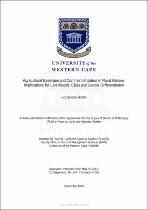Agricultural extension and commercialisation in rural Malawi: implications for livelihoods, class and gender differentiation
Abstract
This doctoral research aims at understanding the relationships between agricultural extension, commercialisation, and social differentiation and their implications for livelihoods in rural Malawi. The research addresses a gap in knowledge about inequalities that are produced as a result of commercialisation and access to agricultural extension. The research analyses the contribution of three extension approaches (commodity-specialised, business-oriented, and government extension) to market-based agriculture among smallholder farmers growing tobacco, groundnuts and maize; the impact of engaging in markets and participating in extension activities on livelihoods; and the class and gender differences resulting or impacting on market-based farming and extension access. The study adopts a mixed methods research design combining qualitative and quantitative data, but predominantly qualitative. The research was conducted in three villages in rural areas of Lilongwe district in central Malawi, through 126 household surveys, 12 focus group discussions, 11 key informant interviews and 13 life histories. The research uses the Marxist agrarian political economy framework to understand social relations determining access to means of production and agricultural extension, resulting in class and gender differentiation and livelihood outcomes. A feminist political economy lens is employed to understand gender differences in access to extension services, market participation, and livelihood outcomes, arguing that women are constrained in their pursuit of economic activities because of the underlying disadvantages and inequalities but also the burden of multiple roles they play. The study also draws on the diffusion of innovations literature to understand the nature of extension services and their contribution to commercial farming. The study uses the political economy lens to understand inequalities in agricultural extension which is rare, but also linking the role of agricultural extension in driving market-based agriculture and livelihoods which is a gap in literature especially in Malawi.

